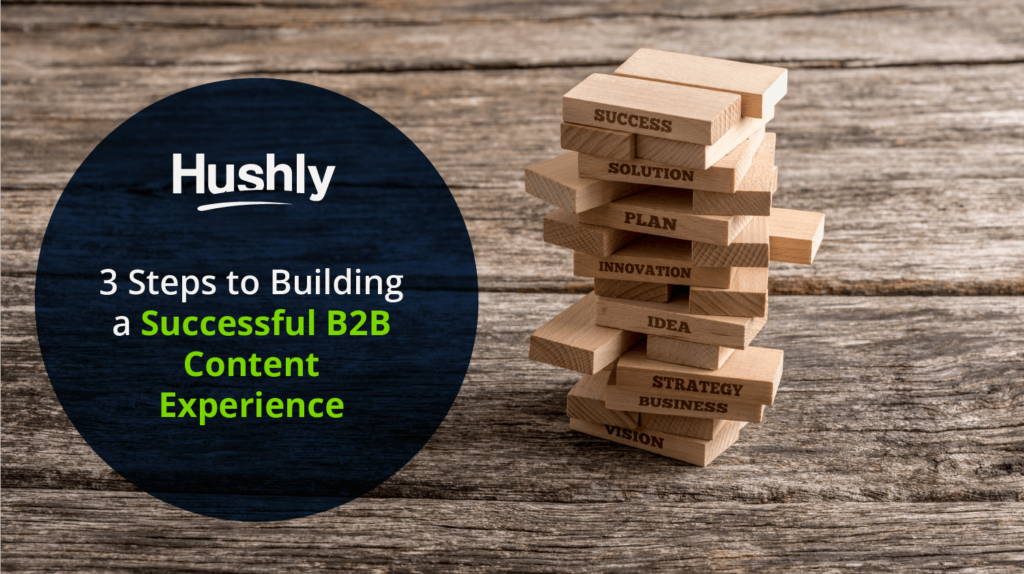Content is the cornerstone of the B2B buyer journey. However, it’s no longer enough to pump out endless content, hoping that something will resonate with your audience. Today’s B2B buyers expect a content experience that speaks to their needs, helps them make sense of a complex market and provides the guidance they need to make a decision. So, how do you build a successful B2B content experience?

A B2B Content Experience is Not the Same as Your Content Strategy
The first step in building a B2B content experience that drives real results is understanding that creating a B2B content experience is not the same as developing a content strategy.
Instead, it’s about incorporating content experience into your overall content strategy.
Your content strategy is the overall plan for how you’re going to achieve your content goals. It defines your goals, audience, and the topics you want to cover. It’s the roadmap for where you’re going, not the vehicle that gets you there. Your content strategy is the backbone of your content, but it’s not the experience itself.
Your B2B content experience is where you bring your content strategy to life. It’s the experience between the time a buyer lands on your page and the moment they’re ready to take the next step in the buying process.

Source: Hushly
Your B2B content experience is where you bring your content strategy to life. It’s the experience between the time a buyer lands on your page and the moment they’re ready to take the next step in the buying process.
It’s the journey that takes place when a buyer is browsing your website, reading your blog posts, watching your videos, and discovering your social media posts. It’s the experience that makes a buyer feel like they’re actually getting value out of the time they spend with your brand. The experience makes a buyer feel like they’re not being sold to, but instead getting the advice and guidance they need to make a decision.
Most importantly, your content experience is the experience that makes a buyer feel like they’re in good hands. They can trust that you’re on their side and that you have their best interests in mind.
3 Steps Needed to Create a B2B Content Experience
By incorporating a B2B content experience into your overall content strategy, you’re able to add a level of sophistication and professionalism that sets you apart from the competition.
This also allows you to create a more meaningful connection with your audience, which in turn increases the likelihood that they’ll take the next step in the buying process or return to your site for more information. It also allows you to prioritize your efforts better and allocate resources to where they’ll have the most significant impact.
Not quite sure to begin? Here are three steps to help you build a B2B content experience you can be proud of:
1. Know Who You are Targeting
Your first step in building a B2B content experience is understanding who you’re targeting. This means not only identifying your ideal accounts, but each individual that makes up the account and that you’ll likely interact with at some point during their account journey.
This will allow you a chance to understand the challenges they face and the goals they’re trying to achieve. It will also allow you to identify the pain points you can address, their questions, and the content they most need. Knowing who you’re targeting will enable you to develop specific messaging tailored to each persona.
This will help you avoid repeating the same information repeatedly, which will help improve your overall effectiveness. It also gives you the chance to adjust your strategy depending on what stage an account is in the buying process.
2. Audit Your Current Content
Once you know who you are talking to, you need to audit your current content.
One mistake many marketing teams make is not making the most of the content they already have, which can lead to a loss in productivity and a waste of time. This audit will allow you to identify gaps in your current content and determine where you need to expand and where you can trim back. It will also give you the chance to identify the most impactful pieces of content you have and determine where you can create new content to address pain points.
In addition, it gives you the chance to determine what’s working and what’s not, which will help you adjust your strategy as you move forward.
3. Ask Yourself “Why,” “What If,” and “What’s Coming Next”
Once you have a good idea of what content you have, what’s working, and what needs improvement, it’s time to ask yourself some critical questions to help you build a better B2B content experience. The questions you should be asking to help you build on your existing content include:
Why
When evaluating the content that you already have, you’ll want to consider “why” certain types of content worked, “why” others didn’t, “why” your targeted accounts have turned to your competition, etc.
This will allow you to better address specific pain points, which will help you better understand the challenges your targeted audience faces. It will also allow you to determine how you can create more impactful content that creates a more desirable content experience for your audience.
What If
For each question you have, you should also develop a “what if” scenario that presents a potential solution. For example, if you ask “why” certain types of content are working, you should develop a “what if” scenario that presents a new way of approaching the same problem. This will help you identify new opportunities to address pain points and create more impactful content.
What’s Next
Finally, you want to ask yourself “what’s coming next” to help you determine where you should take your audience’s content experience next. This will allow you to determine what needs to be delivered next to keep your audience engaged and keep them coming back for more. It will also help you identify trends and adjustments you can make to your strategy to continue to improve your content experience.
Get More from Your Content Marketing with Hushly
Hushly is a platform that makes it easy to create, monitor, and optimize B2B content. From adaptive content hubs to content analytics – Hushly can help you make the most of your content marketing, so you get the results you want.
Curious how Hushly can help you see your best results yet? Schedule your demo today!

